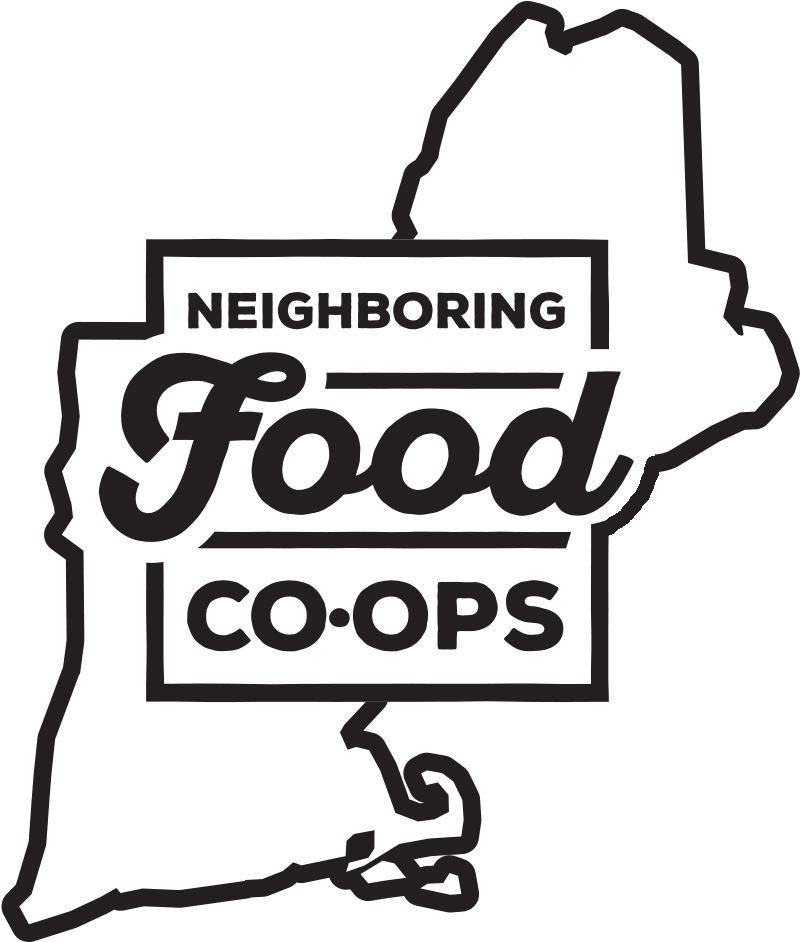 Your Neighboring Food Co-ops
Your Neighboring Food Co-ops
Locally Owned by More Than
140,000 People Like You!
In this Month’s E-News, check out:
NFCA’s Annual Meeting: From Soil to Sovereignty — Good For For All!
On March 23, 2019, co-operators from across the Northeast U.S. 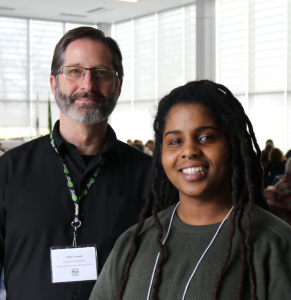 gathered in Greenfield, MA, for the Eighth Annual Meeting & Gathering of the Neighboring Food Co-op Association (NFCA).
gathered in Greenfield, MA, for the Eighth Annual Meeting & Gathering of the Neighboring Food Co-op Association (NFCA).
Organized around the theme, “From Soil to Sovereignty: Good Food For All,” the event brought together 140 representatives from more than 50 food co-ops, start-up initiatives, and partner organizations for a day of presentations, workshops, dialog, and celebration.
“As a regional co-operative of food co-ops, the NFCA is focused on helping its members collaborate, innovate and succeed,” said Erbin Crowell, Executive Director (pictured at left). “And as we have worked to achieve our vision of a more healthy, just, and sustainable food system, a central piece of our journey has been ensuring that our co-ops are welcoming and inclusive of our communities.”
Keynote speaker for the day was Ruth Tyson (pictured at right), Coalitions Coordinator for the Food & Environment program at Union of Concerned Scientists (UCS). Ruth facilitates the Good Food for All Coalition, which unites grassroots and national organizations around a vision for a just, equitable, and sustainable food system through Federal farm and food policy that centers restoration and reparation. Tyson’s presentation focused on the role and potential of Food Co-ops at the intersection of food security, diversity and inclusion, economic democracy, and climate change.
“Your co-ops are already contributing to this work because you are putting people’s needs before profit,” said Tyson. “But how well does your co-op represent your community’s demographics? What are you doing to increase this representation and participation? And how can you, as an association of co-ops, use your collective purchasing power and policy advocacy to support racial equity in the food system?” These questions provided an opportunity for dialog among attendees on successful strategies for inclusion and how our co-ops can do more.
In addition to reports from the NFCA Board of Directors and Staff, networking opportunities provided space for peer-to-peer dialogues on engaging co-ops in healthy food access policy, prepared foods for smaller food co-ops, employment issues, diversity, equity and inclusion, and membership development strategies. Afternoon workshops shared successful strategies for addressing climate change, co-op business training, and tools for building successful start-ups.
Special guests at the gathering included Ben Burkett, State Director of the Mississippi State Association of Cooperatives (the local arm of the Federation of Southern Cooperatives), and Terry Appleby, retired General Manager at Hanover Consumer Co-op, a founding visionary of the NFCA and Co-op Hall of Fame inductee for 2019. Daniel Côté of Saint Mary’s University offered an introduction to some of the topics to be covered in the Enhancing Business Performance Training (this Oct. 24-25) in his Integrating Impact into Co-op Planning: The Balanced Score Card presentation, and facilitated sharing of lessons learned from co-op leaders who participated in the training last fall.
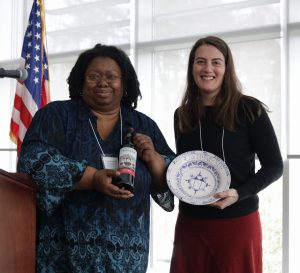
Faye Mack, NFCA President and President of City Market/ OnionRiver Co-op, awarded Patrice Lockert Anthony, President of GreenStar Co-op Market, NY, with the 2019 “Neighboring Co-operator” award, acknowledging her leadership and collaboration in helping our co-ops confront and address issues of diversity, equity, and inclusion.
Individuals and organizations are invited to make a tax-deductible contribution in honor of Patrice to the Bowers Fund of the Cooperative Development Foundation, which supports training and education for food co-op staff, managers, and board members. To learn more and make a donation, visit www.cdf.coop/nfca.
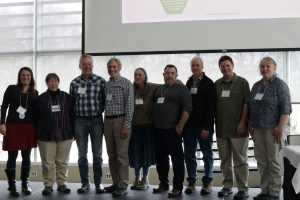
The NFCA is a co-operative federation with food co-ops as its members, and the Annual Meeting included announcement of Board of Directors elections. NFCA Vice President John Crane (General Manager, Portland Food Co-op, ME) announced the re-election of Faye Mack (President, City Market, Onion River Co-op, VT) and Michael Wells (President, Putney Food Co-op, VT) to three-year terms. Continuing on the Board of Directors are Katharine Arnold (Buffalo Mountain Co-op, VT), John Crane (Portland Food Co-op, ME), David Durfee (Wild Oats Co-op Market, MA), Neomi Lauritsen (Springfield Food Co-op, VT), Sue Miller (Upper Valley Food Co-op, VT), and Chris Whiton (Littleton Food Co-op, NH).
John Crane thanked outgoing Board Member Kari Bradley (General Manager, Hunger Mountain Co-op, VT) for his service on the NFCA Board. Bradley was a visionary of the NFCA, participating in the original steering committee, becoming a founding incorporator in 2011, and serving on the Board of Directors until the end of this term. “It has been a pleasure to serve on this Board and to see how far we have come as and organization,” he said. “Thank you.” In appreciation of his service, Kari was awarded with a ceramic dish, hand thrown by Shelburne Falls, MA, potter Stephen Earp, and adorned with the co-operative symbol of the twin pines.
The Neighboring Food Co-op Association includes over 35 food co-ops and start-ups across New England and New York, locally owned by over 140,000 people like you! For more information, visit: www.nfca.coop.

Thanks to CoBank for their support of our Neighboring Food Co-ops
Training: Enhancing Co-op Business Performance
Ready for growth? Ready to move up into a new leadership position at your Co-op or Credit Union?
The Neighboring Food Co-op Association is hosting a second 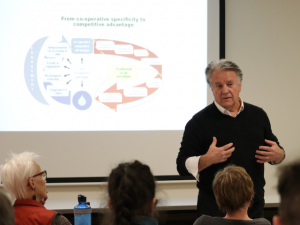 Annual training with Professor Daniel Côté of Saint Mary’s University, October 24 – 25, 2019 in Greenfield, MA.
Annual training with Professor Daniel Côté of Saint Mary’s University, October 24 – 25, 2019 in Greenfield, MA.
Enhancing Co-operative Business Performance: How to Strengthen Identity, Loyalty and Participation will be an interactive intensive professional development opportunity focused on learning new practices leading thinking in co-operative management coupled with tangible examples of how to translate knowledge into action.
“The Executive Education course gave me a chance to step outside the everyday routine of running a food co-op and learn with other co-operators, including those from other co-op sectors,” said Patty Smith, Operations Manager at the Willimantic Food Co-op (CT). “The focus on renewing our individual co-operative identities to stay relevant in today’s marketplace gave me many ah-ha! moments, and I came back to work with an enhanced view of the big co-op picture, as well as lots of new tactical ideas to improve my co-op’s operations.”
Who should come? Co-op General Managers/CEOs, Senior Managers, Board Members and Staff.
More info: https://nfca.coop/events/
Now Offering Personal Impact Deposit Accounts

Open an account today and help increase access to local, healthy food, deliver health care to more people, create affordable housing and build renewable energy. Your Choices Reflect Your Values. Your Bank Should Too. Check our rates and Open an Account today
March’s Cave to Co-op Special
Sugar Slalom by Mt. Mansfield Creamery, Morrisville, VT
Sugar Slalom is an aged natural rind cheese, made with raw  Vermont cow milk and Maple Liqueur, made at Green Mountain Distillers in Morristown, VT. Mt. Mansfield Creamery is in the heart of Morrisville in the Old Farmers Creamery building. The cheesemakers, Stan and Debora Bisini, have been making small batches of cheese since 2009. They wash and brush the rinds to keep them thin to ensure that all the cheese is 100% edible.
Vermont cow milk and Maple Liqueur, made at Green Mountain Distillers in Morristown, VT. Mt. Mansfield Creamery is in the heart of Morrisville in the Old Farmers Creamery building. The cheesemakers, Stan and Debora Bisini, have been making small batches of cheese since 2009. They wash and brush the rinds to keep them thin to ensure that all the cheese is 100% edible.
The creamery is located four miles from the farm where the cows live. Stan transports their milk to the creamery on cheese making days, and Debora milks the cows and ships extra milk to the St. Albans Cooperative. They milk registered Holstein and Brown Swiss cows who are on rotational grazing in the summer months and who are fed grain and hay during the winter. The cheese is great on its own, but check out this lovely maple popover recipe which highlights Sugar Slaloms’ unique flavor.
Cheesy Maple Popovers
Makes 12 popovers
- 4 Cup whole milk
- 8 eggs
- 4 Cup all purpose flour
- ¼ Cup Maple Syrup
- 1 ½ T salt
- 2½ cups grated Sugar Slalom cheese
Place the popover pan in the oven and turn it on to 350 degrees, allowing both the pan and oven to preheat. In a medium saucepan warm the milk over low heat. Meanwhile, whisk the eggs with the maple syrup and then slowly whisk in the warm milk, a little at a time, making sure not to cook the eggs. Set aside. Next sift the flour and the salt together and slowly add this to your egg mixture. Combine gently until smooth. Remove your popover pan from the oven. Spray with a nonstick vegetable spray, or use butter or shortening to carefully grease the hot pan. Fill each popover cup about three-fourths of the way. Place about 3 tablespoons of cheese on the top of each popover. Bake for about 45 minutes in the 350-degree oven. When they are tall and golden, remove the pan from the oven and remove the popovers from the pan. Serve hot with butter.
Cave to Co-op is a partnership between Provisions International and the Neighboring Food Co-op Association (NFCA) to support artisanal cheese producers in our region and make their products more easily available to co-op shoppers. Each month, a delicious local cheese is featured at a great price.
More info and recipes: https://nfca.coop/cave-to-co-op-march-2019/
For more information on Cave to Co-op, visit: www.nfca.coop/CaveToCo-op

Thanks to Organic Valley for their support of our Neighboring Food Co-ops
Co-op Corner: The Art of Co-operating
Last fall I received an intriguing invitation to a meeting in La Crosse, Wisconsin: “Will you help us create a better future?”
By Erbin Crowell, Executive Director, NFCA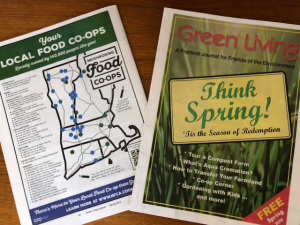
Last fall I received an intriguing invitation to a meeting in La Crosse, Wisconsin. “Will you help us create a better future?” it asked. “The Art of Co-operating” would be a “gathering of diverse enterprises and individuals committed to the success of ownership models that include social and environmental values and promote the democratic ideals of cooperation.” January may seem like a questionable time to travel to the snowy Upper Midwest, but the invitation came from CROPP Co-operative, better known as Organic Valley, a visionary farmer-owned business that has not just changed the organic industry, but has challenged assumptions about what successful, innovative, and impactful enterprise can look like.
The purpose of the gathering was to create space for more stories, for people to compare notes, and to explore co-operative and other ownership alternatives. Participants included co-operators, representatives of indigenous nations, organizers in communities of color, and new initiatives aimed at spreading ownership more widely.
As one speaker noted, a central challenge is that the “default setting” for businesses in the U.S. — even those with a socially responsible agenda — is the maximization of share value for investor-owners. And yet, this structure is at the heart of many of the problems identified by attendees, from wealth inequality and social injustice, to climate change and the corruption of our political democracy. What, then, are our options?
During the gathering, we heard about successful and inspiring alternatives, such as Cooperative Home Care Associates (CHCA) in the Bronx, New York. Launched in 1985 with 12 employees, CHCA is now the largest worker co-op in the U.S., with more than 2,000 staff. Along the way, this business has empowered home-care workers, primarily women of color in unstable, low paying jobs, to own and govern their work, together. As a result, employees earn roughly twice as much as the industry average and retain their jobs longer.
In the context of growing wealth inequality, what can we learn from experiences such as CHCA, and examples such as the Mondragón Cooperative Corporation centered in the Basque Region of Spain, to expand employee-ownership? Hilary Abell, a former colleague of mine from Equal Exchange and co-founder of Project Equity, noted that there may be an opportunity presented by the retirement of thousands of Baby Boomers who own nearly half of the privately-held businesses in our country. These enterprises currently provide 25 million jobs, employing 1 in 6 workers in the U.S. As these business owners retire, only a small percentage of their businesses will be passed on to family members or sold to other buyers. What would it look like to instead transfer these businesses to co-operative ownership as a way to retain vital economic infrastructure in our communities?
One advantage of co-operative enterprise is that it is a proven model with over 170 years of history. Established in the 1800s, the laws enabling people to establish formal co-ops were built on traditional structures of self-help, mutual aid, and democratic decision-making. In a very real sense, these statutes afforded legal protection to people working to meet their own needs and defend their communities from the disruptive changes brought on by the Industrial Revolution. For this reason, co-operatives have found fertile ground around the world not as replacement for local efforts, but as effective tools for collective action in response to economic and social change. It has also spread across the economy, from farmer co-ops to food co-ops, credit unions to worker co-ops, and housing co-ops to artisan co-ops. Today, the National Cooperative Business Association (NCBA CLUSA) estimates that 1 in 3 people are members of more than 65,000 co-operatives in the U.S.
Of course, the flip side to the long history of co-operation is that its shortcomings are also visible. Co-ops are not perfect, and sometimes they fail. At times in history, co-ops have not been responsive to wider community needs, or have fallen under the influence of national governments or external organizations. Critiques of the model include slow growth and limited returns to investors, and the possibility that members might choose to move their business, convert it to a conventional corporation (referred to as ‘demutualization’), or simply sell it off for private gain.
Another model presented at the gathering was the “purpose trust,” which places a business under the ownership of a perpetual trust with no beneficiaries. A range of stakeholders including employees, non-profits, other businesses, and investors could be included in the board overseeing the trust. Also proposed were models of “co-ops” formed by non-profit organizations that held ownership in the businesses they helped launch and could veto certain member decisions or even remove elected officers. The goal would be to accelerate economic development in marginalized communities while ensuring that these enterprises stayed true to the original goals of the parent non-profit.
While interesting, it is important to note that both of these approaches are untested in terms of their potential impact, resilience, and broad application to the issues that we face today. They also depart from the core co-operative principle of autonomy and independence, and a key strength of the model, which is direct ownership and democratic governance of the business by the people who actively use it for products, services, or employment. Because of this unique relationship, members have a vested interest the success, impact, and sustainability of their shared enterprise, which is supported by the principle of ongoing education, training, and information to ensure that members, elected representatives, managers, and employees can contribute effectively to co-op governance and operation.
The co-operative movement is a living thing, guided by internationally recognized values and principles that have evolved in response to changes in the global economy and political environment. At various times in history, this model has been crucial to enabling people of limited means to contend with economic and social change. More recently, co-ops and their members are turning their attention wealth inequality, diversity and inclusion, and climate change.
“We have seen historic examples of people using the co-operative business model to transform their place in the economy,” said Doug O’Brien, President and CEO of NCBA CLUSA, in his greeting to the gathering. “We can build an economy that is sustainable and stable — one in which people can more broadly participate — but only if we invest our own time and energy.”
This brings us back to Organic Valley, which recently celebrated as it crossed the threshold of $1 billion in revenue. That sounds big, and it is big. But Organic Valley is also small: It is a co-operative business owned and democratically governed by 2,000 family farmers — including over 600 here in the Northeast — who have used this business model to take collective action for the shared wellbeing of its members and their communities. Organic Valley is also investing its time, energy, and resources in a dialogue on how the co-operative movement and other models of ownership caner bin address the challenges that we face today, as well as the opportunities of the future. That is the art of co-operating.
Erbin Crowell is Executive Director of the Neighboring Food Co-op Association, serves on the Board of Directors of NCBA CLUSA, and is an adjunct lecturer at UMASS Amherst where he teaches courses on the co-operative movement. He may be contacted at erbin@nfca.coop.
This article was originally published in Green Living Journal. For a PDF, please click HERE.
Become a Friend of Our Farmers & Fishermen

As a Member of your Neighboring Food Co-op, you can join the Farmers Union at a special rate. For more information, visit www.newenglandfarmersunion.org.
National Farmers Union College Conference on Co-ops
In February, National Farmers Union hosted 71 students in Minneapolis, MN, for its annual College Conference on 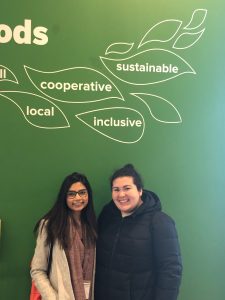 Co-operatives.
Co-operatives.
National Farmers Union (NFU) hosted 71 students in Minneapolis, Minnesota, in February for its annual College Conference on Co-operatives (CCOC). The three-day conference provides an interactive learning experience for the next generation of farmers in America on the importance, structure, and operations of various types of co-operative groups.
This year, the New England Farmers Union provided scholarships to support the participation of two representatives from the Northeast: Sansha Khakhar (pictured left), a candidate for the Certificate in Applied Research on Co-operative Enterprises through the Economics Department at UMass Amherst, and Anastasia Maher (right), a staff member at Littleton Food Co-op in Littleton, NH, and student at Simmons University.
“Co-operatives play a vital role in strengthening both rural and urban economies and communities across the country,” said NFU President Roger Johnson. “NFU’s CCOC draws on our more than 115 years of leadership in co-operative development and education, and demonstrates our organization’s commitment to co-operative principles. We engage tomorrow’s agricultural leaders in hands-on application of cooperative business principles and structures. This teaches them about the opportunities available to them through the co-operative model.”
“It was an eye opening experience to see the co-operative business model reflected in a number of different industries in Minneapolis, and to hear about its national scale from other conference participants,” said Anastasia. “The best part was being able to reflect on the commonalities of our co-operative experiences; everything from being guided by the same principals to having the same go-to snacks at a food co-op. As a student, it was great to be surrounded by other like-minded students as we reflected on how we can integrate co-ops into our future.”
Representatives and farmers from traditional and value-added agricultural co-operatives, housing and worker-owned co-ops, and consumer co-operatives offered their insight on co-operative development. Students heard from William Nelson, former president of CHS Foundation, and Nanci Lilja, current president of CHS Foundation. In addition, participants visited several area co-ops, including Mississippi Market Food Co-op, Seward Co-op, Valley View Senior Housing Co-op, Riverton Housing Co-op and REI, as well as the Mill City Museum, a river-front museum built into the ruins of what was once the world’s largest flour mill.
“The conference was an amazing experience for me to get exposed to different types and sizes of co-operative organizations,” said Sansha. “Before the conference, I was only aware of relatively small scale worker and food co-ops. Through the conference, I was able to learn about the magnitude that co-operatives can reach and the potential economic and social impact they can make in communities.”
“NFU was founded on the core principles of education and co-operation, and we proudly continue that emphasis today with in-person learning experiences like CCOC,” said Johnson. “Thanks to the support of our sponsors, NFU is able to provide cooperative education beyond the farm and ranch gate to young leaders from college campuses across the United States,” Johnson concluded.
This year’s conference was made possible by premier supporters CHS Foundation, CHS Inc., CoBank, Farmers Union Industries Foundation, and NFU Foundation.
To learn more, visit www.nfu.org/education/ccoc/
* * * *
The New England Farmers Union Needs You!
If you care about where your food comes from and want to support the people who produce it, consider joining NEFU as a Friend of the Farmer for just $15. Your membership will help ensure that our region’s producers and consumers are heard by policy makers here at home and in Washington, DC. For more information, please visit www.newenglandfarmersunion.org.
The Neighboring Food Co-op Association (NFCA) is an affiliate member of the New England Farmers Union (NEFU), representing our commitment to collaboration among consumers and our region’s family farmers and fishermen to influence food system policy and build a more vibrant, resilient and co-operative food system in the Northeast.
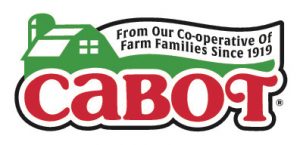
Thanks to Cabot Creamery Co-operative for their support of our Neighboring Food Co-ops
Our Neighborhood Co-op Calendar
For More Co-op & Food System Related Events visit:
MAY 2019
May 8, 2019
Co-op Hall of Fame, National Press Club, Washington, DC
Join us in celebrating the induction of Terry Appleby, retired General Manager of Co-op Food Stores, Hanover Consumer Co-op, and a founding visionary of the NFCA!
May 18, 2019
NFCA 4th Annual Start-Up Food Co-op Gathering, Keene, NH
JUNE 2019
June 6-8, 2019
CCMA National Food Co-op Conference, Durham, NC
AUGUST 2019
Aug 10-12
NOFA Summer Conference, Amherst, MA
Sponsored by the NFCA
https://nofasummerconference.org
Aug 16-18, 2019
Federation of Southern Co-operatives 52nd Annual Meeting
OCTOBER 2019
OCTOBER IS CO-OP MONTH!
Oct 2-4
NCBA CLUSA Co-op Impact Conference
https://www.impactconference.coop
Oct 19
CDS Co-op Cafe, Keene, NH
Co-Hosted by the NFCA
Oct 25-25
Saint Mary’s University Co-op Management Training, Greenfield, MA
Enhancing Business Performance through Co-operative Management Practices
Hosted by the NFCA
The Neighboring Food Co-op Association (NFCA) is a co-operative federation of 35 food co-ops and start-up initiatives across New England, working together toward a shared vision of a thriving co-operative economy, rooted in a healthy, just, and sustainable food system and a vibrant community of co-operative enterprise.

